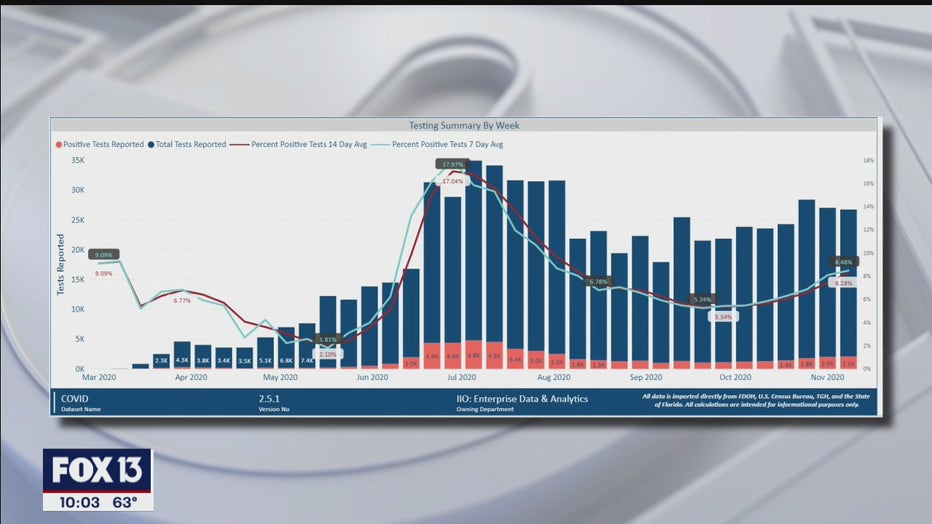Tampa could see COVID-19 peak in January, health expert explains
TAMPA, Fla. - Scientists who track COVID-19 and make projections about the future spread of the virus say we need to act fast to flatten the current surge -- nationally and in Florida.
After months of studying the virus, infection disease modelers are looking back at what they’ve learned so far about the virus and how relaxing restrictions impacted its transmission.
COVID UPDATES: Download the free FOX 13 News app for ongoing coronavirus coverage and live updates
“So when the lockdowns were released and you didn’t end the epidemic before you released the lockdown, there was still substantive infected people. We warned them from the beginning that this is what you’re to find,” said Edwin Michael, a professor of epidemiology and infectious disease modeler at the University of South Florida.
Florida is seeing an uptick in cases this month, reporting numbers not seen since this summer. In Hillsborough County, the 7-day rolling average for percent positivity is at 8.4%, and in Pinellas County, it stands at 6.1%.
Michael said it is a second wave that was expected, and he said virus modeling shows the outbreak is on track to get worse if nothing changes.

“The models are saying that for Tampa, the next wave, if the current social measures are maintained, the next wave will peak towards the end of January,” said Michael. “We have now let our guard down on the social measures and as soon as you do that -- bingo! It’s inevitable. You’ll get the surge, the spike.”
Saint Leo University’s Jacob Aguilar is an infectious disease modeler who tracks asymptomatic COVID-19 transmission. He said his national projections have been pretty spot on.
“So we posted something early in October around this time we suspected we would have around 11 million total cases,” said Aguilar, an assistant professor of mathematics at Saint Leo.
Aguilar shared what Florida could see by the end of the year.
MORE: 7,459 new Florida coronavirus cases reported Tuesday; 85 new deaths
“Just concerning Florida for example, we could easily see a 50% increase in cases. Now we’re at 800,000 right now, we can definitely reach 1 million by that point,” he said.
The recent surge shows how quickly the virus can bounce back, Aguilar shared.
“We can have it subdued for an amount of time, and all it takes is a small amount of time for people to not take the mask-wearing seriously, to not adhere to the social distancing, and it just balloons,” said Aguilar.
To get the virus under control, researchers said everyone has to push through the pandemic fatigue.
RELATED: Weighing the risks: Even college students should skip going home for holidays, health experts say
“It’s been a long year, and now’s the time when everybody’s kind of getting tired. That’s precisely the time when we need to be strong with it,” said Aguilar
They said smaller-scale changes can make a big difference.
“If you increase the current social measures by 10%, like strict face mask-wearing and strict physical distancing just by 10 percent, you will flatten the curve,” said Michael.
The scientists said wearing a mask works, and they’ve seen that through their virus tracking. With the holidays coming up, scientists said people can’t let their guard down.
If you feel sick:
The Florida Department of Health has opened a COVID-19 Call Center at 1-866-779-6121. Agents will answer questions around the clock. Questions may also be emailed to covid-19@flhealth.gov. Email responses will be sent during call center hours.
LINK: Florida's COVID-19 website
CORONAVIRUS IN FLORIDA: What you need to know
AROUND THE WORLD: CoronavirusNOW.com
Map of known COVID-19 cases:
MOBILE APP USERS: Click here for map


